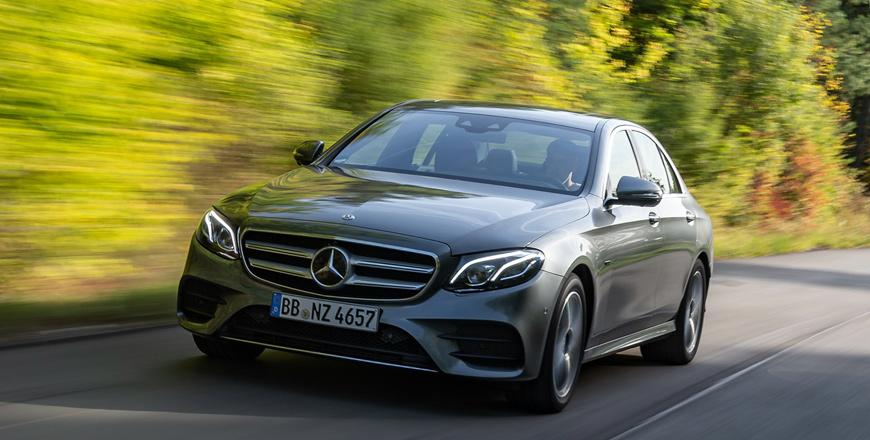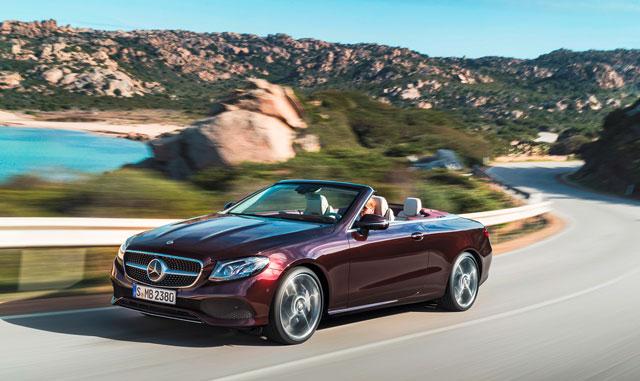You are here
Mercedes-Benz E350: Class act executive hybrid
By Ghaith Madadha - Nov 01,2021 - Last updated at Nov 02,2021
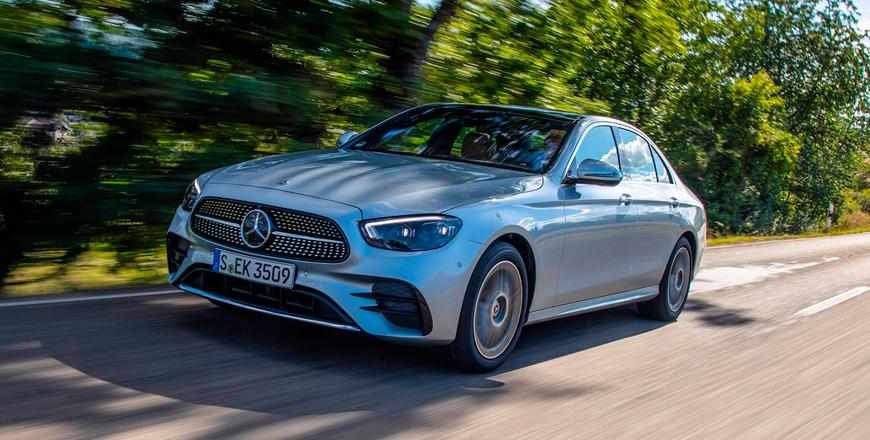
Photos courtesy of Mercedes-Benz
Refreshed to more closely integrate with the German manufacturer’s revised design language as exemplified by new S- and C-Class models, Mercedes-Benz’s mid-size premium E-Class saloon returns to high tax markets in E350 guise.
Powered again by Mercedes’ high power 2-litre mild hybrid engine, the E350 is a quick, comfortable and conservatively styled hybrid executive saloon that appeals to drivers that might not be too enthusiastic about electrification, in that its design downplays its hybrid nature, while electric input serves to complement rather than subvert its combustion engine’s charms.
A curvier and more flowing design when first introduced in 2016, than its chunkier predecessor, the elegant, fluent and smoothly styled E-Class underwent a significant aesthetic face-lift last year for the current model year.
Bearing stronger resemblance to Mercedes’ newer models, the revised E-Class’s most obvious changes are at the rear, where it trades the outgoing model’s vertically-oriented diamond-like rear lights for more dramatically slim, prominently browed and horizontally-oriented lights, and includes slight bootlid and bumper changes at the rear, and in front to accommodate a new grille outline.
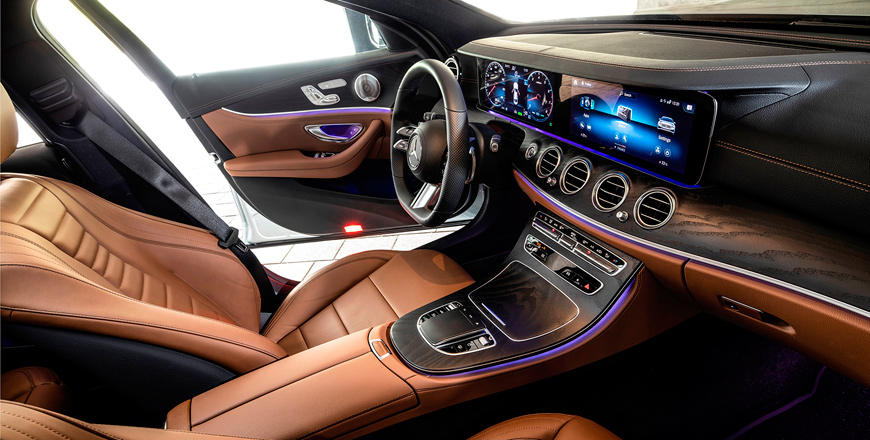
Athletic aesthetic
In front, the revised E-Class receives a new grille that is wider at the bottom, rather than the top, for a more dramatic and formal look, in addition to revised lights.
Driven with AMG Line exterior styling that aesthetically emphasises its athleticism, the revised E-Class features a new floating tri-pronged star emblem, flanked by single — rather than double — slats and a studded background grille pattern. In E350 guise, there are thankfully are no virtue-signaling badges, colours or design whimsies to allude to its hybrid drive-line, that might otherwise undermine its appeal.
With arcing lines, long snouty bonnet and grille, tapered rear, and flowing creases, the revised E-Class retains a fresh and contemporary aesthetic that is both elegant and sporty, especially with AMG appearance package. Meanwhile, and under its aggressive twin ridged bonnet, the driven E350 version is powered by a turbocharged direct injection 2-litre 4-cylinder engine developing 295BHP at 5,800-6,100rpm and 295lb/ft torque at 3,000-4,000rpm. Driving rear wheels through a smooth shifting 9-speed automatic gearbox, the E350 carries its 1,789kg mass through 0-100km/h in 5.9-seconds and onto an electronically-limited 250km/h maximum.
Punchy and prodigious
More eager in character than previous Mercedes turbo 2-litres, the E350’s delivery is more peaky and with narrower plateaus. The result is a seemingly punchier and more visceral driving experience, as power wells up quickly from mid-range. Though more linear, the E350 still offers plenty of early and mid-range torque for effortlessly muscular overtaking versatility and confidence on inclines. Quick-spooling from standstill, the E350’s delivery remains responsive to redline. Meanwhile, the E350’s combustion engine is subtly supplemented by its electric starter/generator 48V mild hybrid system, when necessary.
Producing 14BHP and 110lb/ft, the E350’s 48V hybrid system recovers kinetic braking energy and powers ancillary systems to reduce fuel consumption to 7.7l/100km, combined, and allows longer automatic coasting during driving and when coming to a stop. In helping drive the E350, the 48V system provides small supplementary bursts of power at up to 2,500rpm, and seemingly at full throttle. Well-integrated and near seamless, such assistance little interferes with driving fluency, with brief and rare moments of slight full throttle lift-off delay the only telltale sign of electrification.
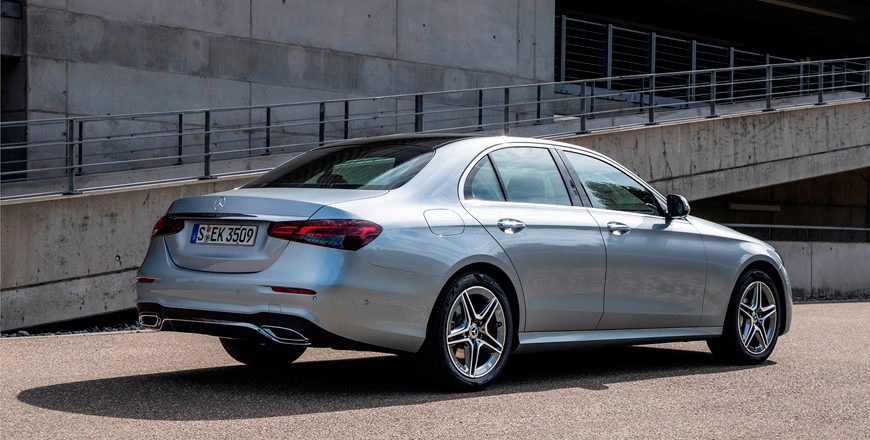
Settled yet sporty
Stable, settled, refined and quiet on motorways with Mercedes’ near trademark ‘planted’ ride quality, the E350 is a smooth and natural long distance Autobahn cruncher. It is meanwhile at home in urban environments, where its cabin is comfortable and spacious — if not as generous in headroom as its immediate predecessor. With light, accurate steering and plenty of driver-assistance features like reversing sensors, 360° camera, parking assistance, blind spot assistance, and tight typically tight Mercedes turning circle, the E350 is meanwhile easily manoeuvrable in town for its class.
Lighter, and with more luggage volume, better drive-line integration and better weighting than the previous, more traditional hybrid E350e model with its heavy rear batteries, the 48V hybrid system E350 is a noticeable more agile and better handling car. Sportier than expected for an executive luxury express, the E350 feels light on its feet and alert through corners, with a quick, tidy and eager turn-in, while its steering and drive-line, and can be set-up for a meatier feel and more immediate responsiveness through the Dynamic Select driving mode menu.
Buttoned down and balanced
Well balanced, adjustable and agile through corners and with good body lean control, the E350 drives with a sporting sensibility through switchbacks. Committed and nimble into corners, the E350’s staggered low profile 245/40R19 front and 275/35R19 rear tyres provide good steering and braking properties. Rear grip is meanwhile reassuring when loading the outside tyres through a corner. However, it can have a more ‘drifty’ character on low traction tarmac, given its high torque output and subtly surging electric assistance, but upon which time, stability controls swiftly step in.
Intuitive in it chassis balance and steering weighting, the E350 is meanwhile settled and buttoned down in vertical movements, if slightly stiff over unevenly and overly choppy roads, or sudden sharp bumps and cracks. That said, ride quality is mostly smooth and forgiving, even with low profile tyres. Inside, it is refined and luxurious in ambiance, materials and design, with extensive safety features, mod cons and twin infotainment and configurable instrument screens. Driving position is comfortable, highly adjustable and supportive, while rear space is good for its class, and boot volume generous at 540-litres.
TECHNICAL SPECIFICATIONS
- Engine: 2-litre, turbocharged, in-line 4-cylinders
- Bore x stroke: 83 x 92mm
- Compression ratio: 10.5:1
- Valve-train: 16-valve, DOHC, variable timing, direct injection
- Gearbox: 9-speed automatic, rear-wheel-drive
- Ratios: 1st 5.35; 2nd 3.24; 3rd 2.25; 4th 1.64; 5th 1.21; 6th 1.0; 7th 0.86; 8th 0.72; 9th 0.6
- Power, BHP (PS) [kW]: 295 (299) [220] @5,800-6,100rpm
- Specific power: 148.1BHP/litre
- Power-to-weight: 164.9BHP/tonne
- Torque, lb/ft (Nm): 295 (400) @3,000-4,000rpm
- Specific torque: 200.9Nm/litre
- Torque-to-weight: 223.6Nm/tonne
- Hybrid system: 48V starter/alternator
- Electric power, BHP (PS) [kW]: 14 (14) [10]
- Electric torque, lb/ft (Nm): 110 (150)
- 0-100km/h: 5.9-seconds
- Top speed: 250km/h (electronically limited)
- Fuel economy, urban/extra-urban/combined: 10.3-/6.1-/7.7-litres/100km
- CO2 emissions, combined: 175g/km
- Fuel capacity: 66-litres
- Length: 4,923mm
- Wheelbase: 2939mm
- Overhang, F/R: 841/1,143mm
- Track, F/R: 1,616/1,619mm
- Aerodynamic drag co-efficient: 0.26
- Boot capacity: 540-litres
- Kerb weight: 1,789kg (estimate)
- Suspension: Multi-link
- Steering: Electric-assisted rack & pinion
- Turning circle: 11.6-metres
- Brakes: Ventilated discs
- Tyres, F/R: 245/40R19/275/35R19
Related Articles
A mild hybrid version of what is perhaps Jordan’s most popularly aspirational car, the Mercedes-Benz E350 is a powerful, comfortable, classy
One of Mercedes-Benz’s brand defining cars in an ever expanding and diversifying product portfolio, the E-Class executive saloon sums up the
Sitting right in the middle of a broad range of two-seat roadster and four-seat boulevardier convertibles offered across the Mercedes-Benz r


